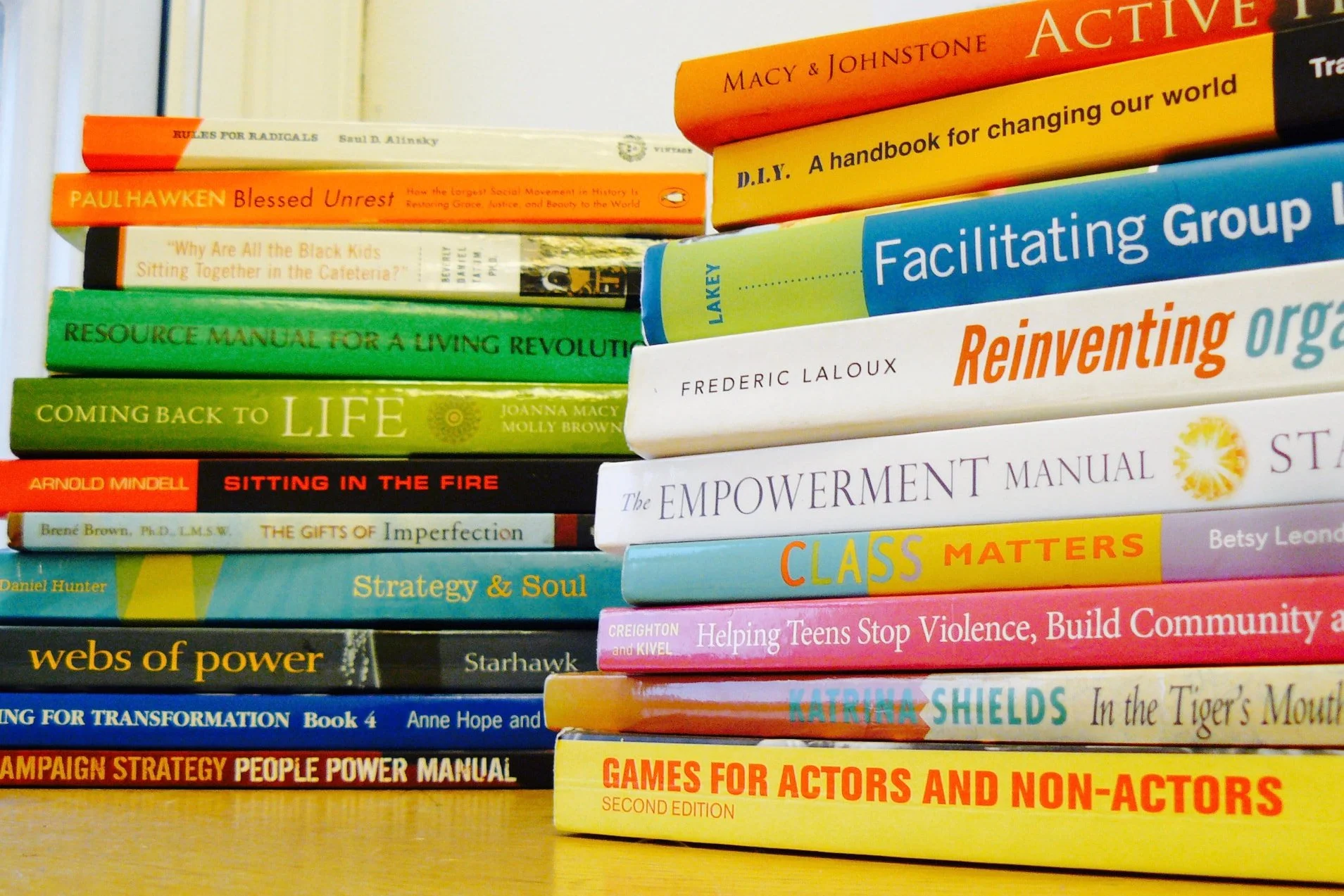
Our Approaches & Influences

Our perspectives and approaches are deeply rooted in and massively woven from the work of others.
We would like to specifically recognise that so many of the ideas that inspire us originate from communities that have been invaded, colonised, and oppressed. We’d also like to acknowledge that around the named people who inspire us, there will be whole communities and experiences of people we don’t know the names of.
Paul has trained Roz and Ama in the core of the work we do at Navigate, we have all been on distinct journeys - you can find out more about our specific influences in our bios.
-
Restorative Circles & Dialogical Systems - Dominic Barter
These areas of work are a huge and central inspiration and influence on our thinking and work. We have learned about them from Dominic Barter, who has been at the centre of the development of this work around conflict, restorative justice and the collaborative development of social systems. Listen to Dominic sharing about this work here and here.
These areas of work began in and grew from favela and other highly marginalised and oppressed communities in Brazil with whom Dominic collaborates. We really want to honour that development and the gifts it has brought us. You can find out more about Restorative Circles and Dialogical Systems and contact Dominic Barter, as well as offer support for the work if it’s been of value to you, here contatodominic@gmail.com
Convergent Facilitation - Miki Kashtan
Convergent Facilitation, was developed by Miki Kashtan from the principles of Nonviolent Communication (NVC), and it’s a major influence on us. Miki’s formulation of 5 organisational systems is a major root of the 7 Living Systems approach (along with the Dialogical Systems work above). Miki’s definition of leadership as ‘holding the whole’ has shaped our thinking and practice, along with her strong focus on connecting with and being moved by Vision. Other elements and principles of our work around collaboration, dialogue, conflict, power, etc. are drawn directly from her work. You can find out more about her work here and here.
Relational Neuroscience, NVC, Constellations - Sarah Peyton
We really appreciate the ways that Sarah brings neuroscience to life, and integrates it with NVC and constellation work. You can see Paul interviewing Sarah about conflict mediation here and find out more about her work here.
Nonviolent Communication (NVC) - Marshall Rosenberg
A profoundly important root of the work of Dominic Barter, Miki Kashtan and Sarah Peyton, is Nonviolent Communication (NVC) which was developed by Marshall Rosenberg in partnership with many others including many from marginalised and oppressed communities, particularly in the USA. As an exploration of what supports collaboration, healing and transformation for people, relationships, groups and communities, it’s at the core of everything we do, including all of our facilitation and mediation work.
Focusing - Eugene Gendlin
Focusing is a practice for opening to the wisdom of the body, listening in to the ‘felt sense’ of our experience with kind attention. We have found it a powerful way for attuning deeply to ourselves and others. Gendlin articulates, ‘your physically felt body is in fact part of a gigantic system of here and other places, now and other times, you and other people, in fact, the whole universe. This sense of being bodily alive in a vast system is the body as it is felt from inside.’
Systems Thinking - Donella Meadows
Donella Meadows has been a massive influence in her articulation of Leverage Points - Places to Intervene in a System and systems and how they move and change generally. We’re also inspired by what she said about the importance of vision.
-
Kurdish Freedom Movement
An incredibly powerful Movement in the world right now that is bringing to life and putting into practice anarchist ideas of radical democracy, feminism and ecology, exploring how to dismantle patriarchy in ourselves, our communities and society. It is a living reality for millions of people right now, and is constantly inspiring to us. Dilar dirik's ‘Kurdish Women's Movement: History, Theory, and Practice’ is a good place to start. And look out for ‘Worth Fighting For: Bringing the Rojava Revolution Home’ by Jenni Keasden and Natalia Szarek.
The Civil Rights Movement
We try to ongoingly learn from this movement and the thousands and thousands of people who made it, with courage, wisdom and Love beyond words.
Fred Hampton & The Black Panther Party
We are very inspired by what we know of Fred Hampton’s leadership and vision in working for liberation, empowerment and systemic transformation for Black communities in the USA, and we particularly want to learn from the work to build coalitions and collaboration across differences that lead to the Rainbow Coalition.
These are a few among the many movements that we find inspiration, hope and learning. Others include: Indian Farmers Strike, Zapatistas, The Uprising of which Boudica was a leader (around the year 60 A.D.), the MST in Brazil, the Indian Independence Movement, and so many more in the past, present and future who strive for a World that works for all.

